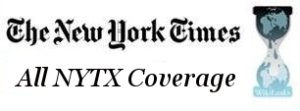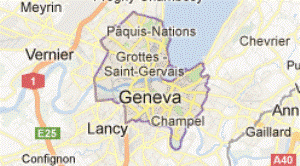HEADLINES » KEEPING SCORE » MARGARET SULLIVAN
The NY Times and the Neocons
July 3, 2014 · 0 Comments

Above: First painting in the 'Neocon' Series, a protest of the Bush administration and its policies. (Image from WikiMedia Commons)
By Murray Polner:
Ten Cheers for Margaret Sullivan, the Times’ gutsy and shrewd Public Editor (or Ombudwoman if you prefer) who took on her employer for its one-sided opinion pages about Iraq since the sudden and unexpected appearance of the ISIS gangs. Washington’s foreign policy elite, helped along by our deferential mainstream media, print and TV, were caught with their pants down. Our vaunted intelligence community had somehow missed another one. Not David Carr though, one of the paper’s sharpest writers, who understood what the experts had overlooked: “while America was done with Iraq, Iraq was not done with America, not by a long shot.”
When the dangers represented by ISIS became a bit clearer, the question was what to do with Iraq. It was as if the world had turned upside down in a country that was once seen as settled by American power and money. In editorial offices everywhere and especially among the city’s endless supply of think tankers confusion reigned. Kick out Maliki? Or is he nothing more than an American scapegoat? Forge a new Sunni-Shiite government in Baghdad? But how? Send in U.S. troops, planes and drones and tons of money to support which side? Fight the ISIS, but they despise Assad and Iran. Or what? It seemed that everyone had an opinion, especially the war party which had vigorously backed the invasion of Iraq in 2003. While Sullivan rightly praised the paper’s foreign on-the-ground reporting, she went after the apparent bias of the paper’s Op Ed writers who having backed the U.S.-led invasion were now again offering their judgments. As one example, she cited an Op Ed piece by Anne-Marie Slaughter, “another proponent of the Iraq war who says Mr. Obama should use force in Syria.”
The paper’s editorial board and columnists initially seemed at sea, wrestling with what to say. It took regular columnist Nicholas Kristof to remind readers of the huge cost in lives and money of America’s reckless decision to invade. Thomas Friedman offered his opinion: “For now, I’d stay out of this fight—not because it’s the best option but because it’s the least bad.” Still, the basic question, complained one reader, was why had the paper welcomed only one set of opinions while thus far avoiding comparable space for dissenting views? Was it because the Times did not take antiwar, anti-interventionist critics too seriously? If so, did its editors still take the neocons more seriously?
| Join Our Free Newsletter |
Remember the neocons, those living room warriors who played so crucial a noncombatant role in the run-up to the Iraq war? When an off-Broadway play opened some years back it had the brilliant title “Now That Communism is Dead My Life Feels Empty.” By the time George W. was in the White House, younger second-string and too often second-rate neocons had flocked to Washington where the jobs, money and prestige were available, courtesy of extremely well-funded right wing think tanks and subsidized publications. After 9/11 they helped spread tales about WMDs and Saddam's close connections to the attackers. Exalters of an American imperium with fantasies of preemptive war, they never considered that the invasion they sought just might result in unexpected consequences: No flowers or kisses from ebullient Iraqi crowds, savage guerrilla resistance, civil wars, and the birth and rebirth of new terrorists. Their dream became a nightmare. Now they’re back.
Times readers have reason to be concerned. The paper ran two straightforward, essentially uncritical pieces about two prominent neocon hawks. In her profile of John Bolton, Jennifer Steinhauer noted that he is “among the cavalcade of neoconservatives newly emerged on cable television and in hawkish policy seminars to say "We told you so’ on Iraq.”( I even saw someone on TV asking Dick Cheney what he would do now).
If that wasn’t enough, Jason Horowitz’s portrait of the neocon historian Robert Kagan -- presumably because Kagan’s New Republic article “Superpowers Don’t Get to Retire: What our tired country still owes the world” caused such “buzz” in Washington that it led to a presidential invitation to lunch, all part of the capital’s inscrutable Byzantine politics. While Horowitz did mention that “the congenial and well-respected scion [was] of one of America’s first families of interventionism” he might also have noted Kagan’s April 2002, article co-authored with his fellow ideologue William Kristol, a true neocon prince and onetime Times columnist, in which they wrote that “the road that leads to real security and peace” [is] “the road that runs through Baghdad.”
Apparently, the editors could not think of a single dissenting commentator on the new Iraq crisis whom they might also care to profile. Someone who hadn't been a cheerleader for the war.
Someone perhaps like Andrew Bacevich, whose academic and military experience rivals that of most of the Op Ed writers invited to comment. He teaches at Boston University, has published extensively, is a West Point graduate, a Vietnam veteran, and the father of a young lieutenant killed in Iraq. “The Duplicity of the Ideologues,” his highly critical analysis of Kagan’s article, appeared in Commonweal, the venerable liberal Catholic journal. When one admirer praised Kagan’s article, calling it “brilliant,” Bacevich retorted that a “more accurate appraisal would be slickly mendacious” and spelled out his reasons in great detail. I wonder if Horowitz or his editors have read it.
Or, perhaps Doug Bandow, a senior fellow at the libertarian Cato Institute and former Special Assistant to President Reagan whose National Interest essay called instead for a new set of U.S. foreign policy priorities. “Not every commitment is equally important. Not ever conflict is equally threatening. Not every problem is equally open to an American solution,” wrote Bandow.
I’ll be happy to suggest to the Op Ed editors many more anti-interventionist writers and scholars.
The Times’ Public Editor Sullivan continued. “Many readers have complained to me that the Times is amplifying the voice of hawkish neoconservatives and serving as a megaphone for anonymously sourced administration leaks, while failing to give voice to those who oppose intervention.” Another outraged reader wrote her: “Another day, another NYT article about a neocon and Iraq! Where are the articles about the hundreds of thousands against escalation?” And in response to an Op-Ed “Who Will Win in Iraq?” one thoughtful reader in Scarsdale, N.Y., answered in a letter, “not us,” concluding “Not a single American should be placed in harm’s way.” Apparently a large majority of Americans recently polled by NYT/CBS News agreed.
Of course it’s far too early to make definitive judgments about the future of Iraq, Syria, ISIS and the Middle East. But Sullivan is dead right that “readers have good reason to be wary about what appears in the paper about military intervention in Iraq.”
At President Obama’s recent press conference in which he announced that only 300 or so “trainers” would be sent to Iraq and no combat troops would follow, a reporter called out “Mr. President, what about ‘mission creep?’” That’s precisely what those who complained to Margaret Sullivan are worried about. With Washington’s long history of deception, they have good reason to worry.
Murray Polner writes our Keeping Score column.
By admin










Sorry, comments are closed on this post.